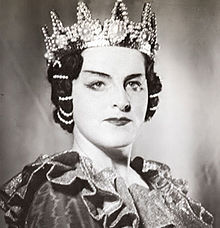Macbeth (Verdi)
Written for the Teatro della Pergola in Florence, Macbeth was Verdi's tenth opera and premiered on 14 March 1847.
By the standards of the subject matter of almost all Italian operas during the first fifty years of the 19th century, Macbeth was highly unusual.
Influenced by his friendship in the 1840s with Andrea Maffei, a poet and man of letters who had suggested both Schiller's Die Räuber (The Robbers) and Shakespeare's play Macbeth as suitable subjects for operas,[4] Giuseppe Verdi received a commission from Florence's Teatro della Pergola, but no particular opera was specified.
[5] He only started working on Macbeth in September 1846, the reason for that choice was the availability of a particular singer, the baritone Felice Varesi who would sing the title role.
(Maffei was already writing a libretto for I masnadieri, which was based on the suggested Schiller play, but it could have been substituted for Macbeth had the baritone not been available.)
[4] Writing to Piave, Verdi made it clear how important this subject was to him: "....This tragedy is one of the greatest creations of man...
The last act begins with an assembly of refugees on the English border and, in the revised version, ends with a chorus of bards celebrating victory over the tyrant.
At first, nothing transpired, but in 1864 Verdi was asked again to provide additional music – a ballet and a final chorus – for a production planned at the Théâtre Lyrique (Théâtre-Lyrique Impérial du Châtelet) in Paris.
In a letter to his publisher, Giulio Ricordi, asking for a copy of the score, Verdi stated, "I would like to lengthen several pieces to give the opera more character.
Verdi's librettist from years before, Francesco Maria Piave, was pressed into service to expand the opera.
However, Verdi had asked for it to be done by Gilbert Duprez, the tenor-turned-teacher in whom he had great confidence and whom he knew from his performances in his first opera for Paris, Jérusalem, in 1847.
Still, the first performance was poorly received by the critics, something which puzzled the composer: "I thought I had done quite well with it...it appears I was mistaken" he stated when he wrote to his Paris publisher, Escudier.
The US premiere of the later version did not occur until 24 October 1941 in New York[18] when it was staged by the New Opera Company at Broadway's 44th Street Theatre with conductor Fritz Busch.
The cast included Jess Walters in the title role, Florence Kirk as Lady Macbeth, Robert Silva as Banquo, Robert Marshall as Macduff, John Hamill as Malcolm, Martha Lipton as the Lady-in-waiting, and Leon Lishner as the Doctor.
[21] Glyndebourne revived it in the 1950s, as did Teatro alla Scala in 1952 with Maria Callas as Lady Macbeth, but it was not until 1959 that it appeared on the Metropolitan Opera's roster for the first time and has often been performed there since then.
In 2012, the Grand Théâtre de Genève presented a production of the opera under the direction of Christof Loy.
Lady Macbeth is advised that King Duncan will stay in the castle that night; she is determined to see him killed (Or tutti, sorgete / "Arise now, all you ministers of hell").
The King and the nobles arrive and Macbeth is emboldened to carry out the murder (Mi si affaccia un pugnal?
Macduff resolves to leave the country, saying it is ruled by a cursed hand and only the wicked may remain: the other guests are terrified by Macbeth's talk of ghosts, phantoms and witches.
No wood has ever moved by magic power") Macbeth is then shown the ghost of Banco and his descendants, eight future Kings of Scotland, verifying the original prophecy.
Macbeth tells his wife about his encounter with the witches and they resolve to track down and kill Banco's son, as well as Macduff (of whose flight they do not yet know) and his family.
Malcolm orders each soldier to cut a branch from a tree in Birnam Wood and carry it as they attack Macbeth's army.
They are determined to liberate Scotland from tyranny (Chorus: La patria tradita / "Our country betrayed").
Scene 2: Macbeth's castle A doctor and a servant observe the Queen as she walks in her sleep, wringing her hands and attempting to clean them of blood (Una macchia è qui tuttora!
Scene 3: The battlefield Macbeth has learned that an army of Scottish rebels backed by England is advancing against him, but is reassured by remembering the words of the apparitions, that no man born of woman can harm him.
The scene ends with a hymn to victory sung by bards, soldiers, and Scottish women (Salve, o re!/ "Hail, oh King!).
Writing in the New Grove Dictionary, musicologist Roger Parker sees the opera as revealing Verdi's "attention to detail and sureness of effect unprecedented in earlier works.
In the "Grand scena di sonnambulismo", admittedly, Verdi did so magically stroke the big strumming guitar of his orchestra, and so chasten the vocal pride of Italian 'bel canto, as to foreshadow his achievements of some forty years later.
[31]Baldini's analysis of the structure of the score in relation to the drama (and the comparison between the two versions) is highly detailed and worthy of examination.
[34] However, along with Parker, he does concede that "even the traditional elements are better handled than in Attila or Alzira [and] the arias grow organically from the implications of their own material, rather than from the deliberate elaboration of a formula.






